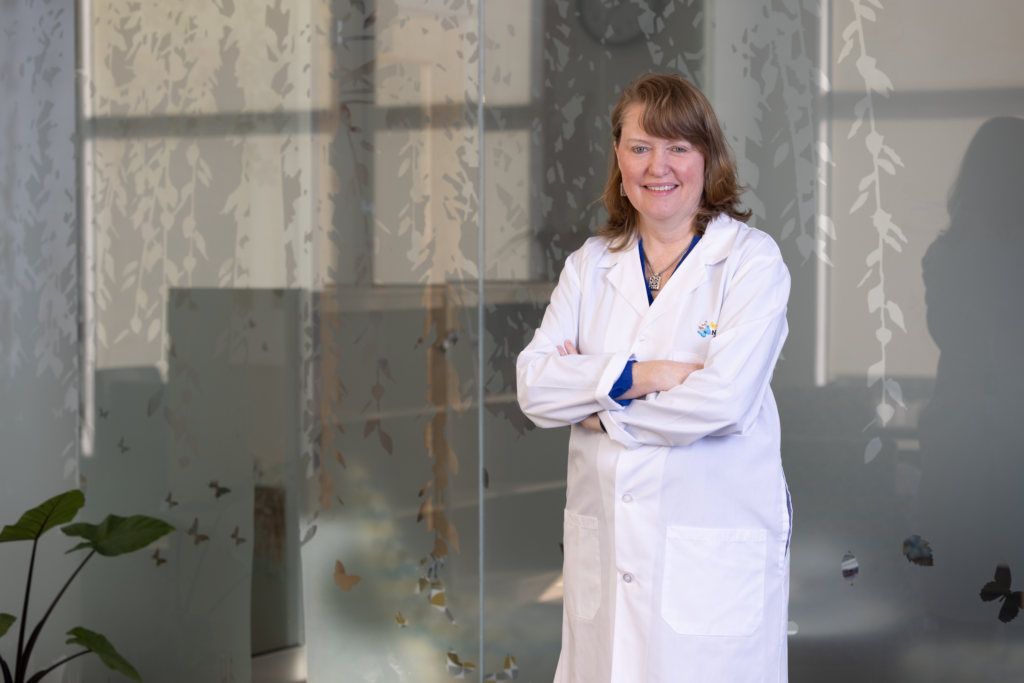5 Things to Know About Prune Belly Syndrome
5 Things to Know About Prune Belly Syndrome https://pediatricsnationwide.org/wp-content/uploads/2023/02/010523BS0125-1024x683.png 1024 683 Abbie Miller Abbie Miller https://pediatricsnationwide.org/wp-content/uploads/2023/05/051023BT016-Abbie-Crop.jpg- February 07, 2023
- Abbie Miller

Linda Baker, MD, urologist, principal investigator, and one of the world’s foremost experts on prune belly syndrome, recently joined Nationwide Children’s Hospital as the co-director of the Kidney and Urinary Tract Center. She shares some important things to know about this rare disease.
1. Prune belly is a rare, congenital malformation.
Prune belly syndrome (PBS) is a congenital malformation of the urogenital system and abdominal wall. It is typically discovered during pregnancy at around 15 weeks via ultrasound, due to the very large urine filled bladder. However, diagnosis during fetal life can be challenging because of look-a-like conditions, such as posterior urethral valves or cloaca.
PBS affects 1 in 50,000 births, and nearly all (95%) of people with PBS are males. About 20% of babies born with PBS are stillborn, and 30% die of renal complications by age 2 years. Dr. Baker estimates that about 1,500 people under age 18 are living with PBS in the United States.
2. The prune belly triad describes key physical features that are helpful in diagnosing PBS.
The three hallmarks that make up the prune belly triad include:
- Wrinkled belly
- Undescended testicles
- Urinary tract dilation
Upon birth, the baby typically has an extremely full bladder. Because urine has not been completely coming out of the baby’s body before birth, 10-20% of cases are in kidney failure at birth. Because fetal urine makes up the amniotic fluid, lung development may also be affected due to the decrease in amniotic fluid.
About half (40-60%) of babies born with PBS have additional birth defects.
3. Most babies with PBS will need multiple surgeries in their early childhood.
The initial treatment for PBS is mostly surgical. Babies with PBS often need multiple surgeries, depending on the child’s condition and the surgeon’s recommendations. Common surgeries in the treatment of PBS include:
- Abdominal “tummy tuck” to reconstruct the belly that is deficient in normal muscle: This procedure is typically done between the ages of 4 months and 1 year.
- Retrieving the testicles: The goal is to have both testicles descended into the scrotum by age 1 year.
- Urinary tract reconstruction
4. Ongoing care and management are required to preserve kidney function.
About 67% with PBS will go into kidney failure during their lifetime. Many are born with poorly formed or dilated kidneys that do not drain urine effectively.
The lack of strong abdominal muscles means most kids/adults with PBS don’t effectively empty the bladder and they make more diluted, water-filled urine. This leads to kidney damage and in some, kidney failure.
Kids with PBS experience many UTIs because they are not able to fully empty the bladder. People with PBS require long-term monitoring to prevent kidney damage.
Ongoing management includes yearly ultrasound. Hypervigilance is crucial. Kids with PBS may not be aware that their bladder is full, so they often need to be reminded to urinate and work hard to empty their bladder.
5. Research is ongoing to find the causes of PBS.
Dr. Baker is conducting National Institutes of Health-funded research to find genetic causes of PBS. Her current grant is funding research designed to:
- Identify mutations or variants that cause PBS
- Characterize the role of her recently identified PBS candidate gene
- Evaluate molecular processes in the organs affected by PBS
Because 95% of PBS patients are male, Dr. Baker is investigating whether the condition could be sex-linked autosomal recessive or X-linked inheritance. To conduct her research, she collaborates with the Prune Belly Syndrome Network (PBSN) to recruit research participants and share research results with families affected by PBS. Few families have more than one family member with PBS, making genetic studies challenging. Nevertheless, Dr. Baker is eager to work with all individuals with PBS to make discoveries that will help their life with PBS.
About the author
Abbie (Roth) Miller, MWC, is a passionate communicator of science. As the manager, medical and science content, at Nationwide Children’s Hospital, she shares stories about innovative research and discovery with audiences ranging from parents to preeminent researchers and leaders. Before coming to Nationwide Children’s, Abbie used her communication skills to engage audiences with a wide variety of science topics. She is a Medical Writer Certified®, credentialed by the American Medical Writers Association.
-
Abbie Millerhttps://pediatricsnationwide.org/author/abbie-miller/
-
Abbie Millerhttps://pediatricsnationwide.org/author/abbie-miller/
-
Abbie Millerhttps://pediatricsnationwide.org/author/abbie-miller/
-
Abbie Millerhttps://pediatricsnationwide.org/author/abbie-miller/
- Posted In:
- Clinical Updates
- Features
- Research







